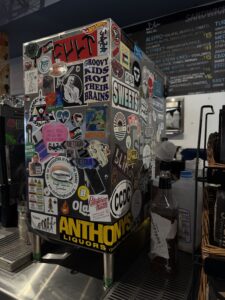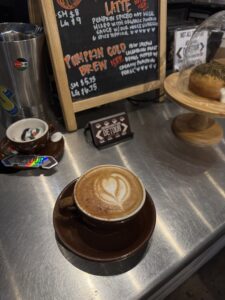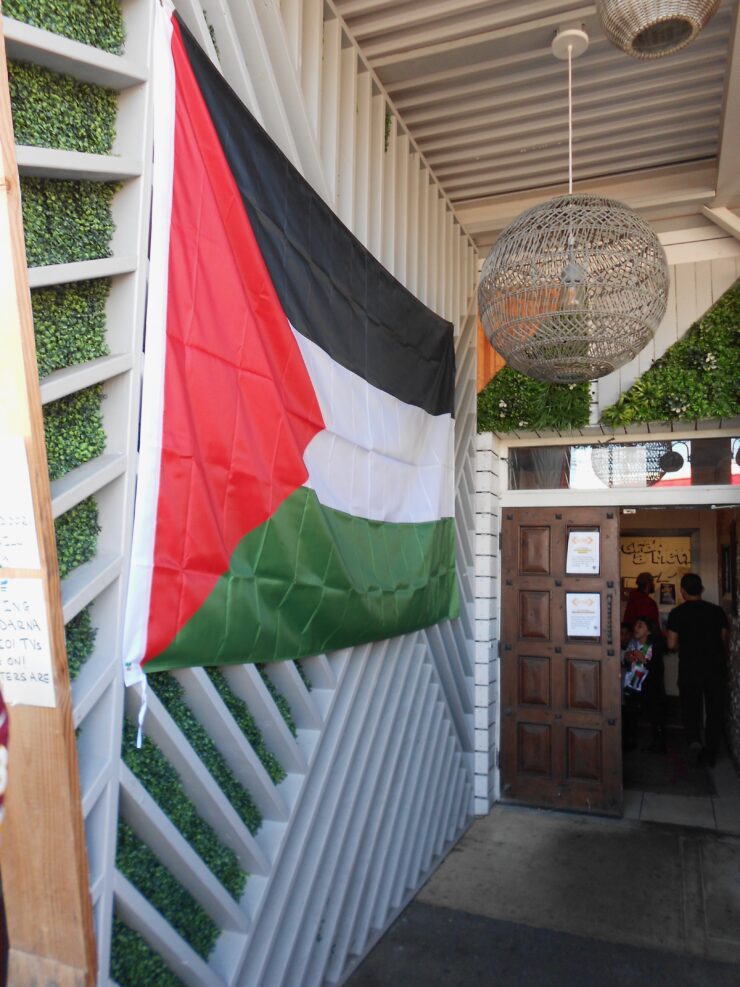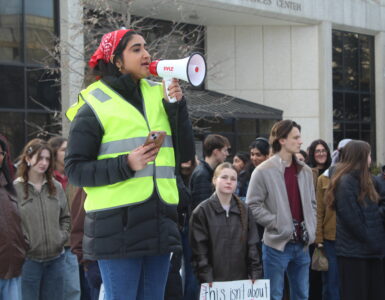By Gwyneth Hill
For diners in D.C., sometimes eating at a restaurant is not just about satiating one’s hunger – it’s an act of solidarity. Patrons are now turning to their forks as a form of protest, a way to support international causes ranging from Ukraine’s fight for sovereignty to Palestinian rights.
This movement, called “gastrodiplomacy,” allows people to make a difference through their dining choices without ever holding a protest sign.
Traditionally, gastrodiplomacy has been associated with government officials engaging over meals and advertising their countries cuisine. Iconic moments include George H.W. Bush’s 1992 dinner with Japanese Prime Minister Kiichi Miyazawa, marred by an unfortunate vomiting incident, and President-elect Donald Trump’s historic lunch with North Korean leader Kim Jong Un.
However, the power of food extends far beyond formal diplomacy, as chef and gastrodiplomacy researcher Sam Chapple-Sokol said. In an article for Public Diplomacy Magazine called “War and Peas,” he argued that food serves as an accessible entry point for everyday people to engage with international conflicts.
Nearly a decade ago, Chapple-Sokol teamed up with Johanna Mendelson-Forman, a professor at American University’s School of International Service, to create a course in conflict cuisines that took students to Ethiopian, El Salvadorian, Afghan and Korean restaurants in D.C., framing these spaces as informal classrooms. “Those restaurants are kind of unofficial embassies of their countries and of their people,” Chapple-Sokol said. “So that an American populist can start learning about those places.”
At Ruta Ukrainian Restaurant in Capitol Hill, the first Ukrainian restaurant in D.C., Director of Operations Ruslan Falkov embraces this concept wholeheartedly. “Every day in our staff meetings, I tell everyone, ‘You are ambassadors of Ukraine, every one of you because you are showcasing Ukrainian dishes,’” Falkov said.
More than 90% of Falkov’s staff is Ukrainian, and many were taken in after fleeing Russia’s war on their county. “So, it is not only place where they work, but it’s also place where they have found friends,” Falkov said. “It’s a community right now.”
The restaurant has recently opened its second location in Bethesda, Maryland. Falkov noted a shift in public interest following Russia’s invasion of Ukraine in 2022. “[Americans] know more about Ukraine, and now they have learned more about our cuisine,” Falkov said. “They developed an interest in understanding and experiencing our cuisine.”
The menu offers a variety of traditional Ukrainian dishes, including several variations of the classic borscht, holubtsi (cabbage rolls stuffed with meat or vegetables), and varenyky (Ukrainian dumplings). Their signature dish is Chicken Kyiv, a fried chicken breast stuffed with mushrooms and served alongside creamy polenta.
Aiden Carlton, a student at American University and the secretary of the organization Students Supporting Ukraine, shared that he often dines at Ruta after attending protests in support of Ukraine. “There isn’t much Ukrainian representation here in D.C.,” Carlton said. “Having Ruta, a place where people can enjoy authentic Ukrainian food regardless of their political involvement, helps draw people in and fosters a personal connection.”
Carlton, like many patrons of Ruta, are not of Ukrainian heritage, Falkov said.
While Ruta decorates its dishes with miniature Ukrainian flags and serves signature blue-and- yellow cocktails, not all restaurant owners find such displays of national pride as widely accepted.
At Detour Coffee Co., a Palestinian-owned cafe, the response has been a bit more contentious. Following the outbreak of the war in Gaza, the coffee shop in Arlington, Virginia, began serving espresso in cups featuring the Palestinian flag and adorning its cash register with stickers in support of Palestine. Noelle Miranda, the cafe’s marketing coordinator, said that these actions have led to a surge of negative reviews on Detour’s Google page.

But Miranda, said on behalf of the owner Ahmad Ayyad that he wanted his shop to be a space for Palestinian allies. “He was like, ‘I don’t care if I lose pro-Israel people, because, you know, I’d rather not have them as customers,’” she said.
Despite some backlash, Detour is busier than ever. Miranda said that Detour has gained many former Starbucks customers amid a boycott over the company’s perceived support of Israel and legal dispute with its workers union over a pro-Palestinian social media post. “We definitely did become a lot busier, you know, with like Starbucks getting canceled last year,” she said.
Miranda said that Detour Coffee’s partnership with Z&Z, a Middle Eastern bakery, has brought even more attention to the cafe. It’s pop-up events, with proceeds donated to humanitarian efforts in Palestine, have drawn such large crowds that the shop had to add outdoor seating to accommodate the overflow.
Despite the growing support, confusion about Detours stance persists. “There’s a lot of the misconception, of course, with the genocide that we support hate or terrorism,” Miranda said. “That’s not what we’re saying. What we’re saying is that these people are being oppressed, and we support them to be free.”
Palestinian chef Jinan Deena, micro-influencer, and owner of pop-up restaurant Bayti, said that creating Palestinian dishes has been a form of resistance in itself. “For Palestinians, the land gives us so much nourishment,” Deena said. “By claiming our food, they cannot disconnect us from our identity.”
When Deena moved to D.C. in 2017, she noticed how frequently Palestinian restaurants and food were falsely labelled as Middle Eastern or Lebanese to avoid pushback or out of fear. Even her own family’s restaurant in Ohio chose to distance itself from their Palestinian identity in its branding.
By the time Deena launched her pop-up in 2021, she felt she had to claim her heritage. “Okay, we’re Palestinian. This is who we are,” Deena said. “We’re probably going to turn off a lot of people who hate that word, but we’re probably also going to attract the right people, and that’s exactly what’s happened.”
At her third annual olive harvest pop-up event in September, Deena said the crowd was more diverse than in previous years. “It’s great, I never wanted my events to just be for the people in my community,” Deena said. “I wanted to reach people outside of that.” Her activism on Instagram, she said, has allowed her to connect with both new and longtime supporters.
A portion of the proceeds of the event went to Palestinian non-profit, the Union of Agricultural Work Committees, which provides employment and funding to Palestinian farmers.
These sort of pop-ups and fundraisers have changed political activism for diners in what Chapple-Sokol referred to as “citizen culinary diplomacy.” In this way, Chapple-Sokol said, restaurants have become a public forum where politically active individuals can work.
But simply dining at restaurants or shopping at businesses owned by a Ukrainian or Palestinian, without any fundraising or advocacy element, has minimal impact on the situation in the country of conflict, Chapple-Sokol said. In the decade since the beginning of his research, Chapple-Sokol has come to understand this topic as far more complicated than he once wrote about. Sometimes food cannot be the great unifier.
“There is no such thing as hummus kumbaya,” he said. “Just by spending $600 on dinner at a restaurant doesn’t change the realities on the ground in Gaza,” Chapple-Sokol said. “But if the goal of the dinner is to learn or share the experience with
others who might be on a different side of the conversation, that can be foundational.”
Even without fundraisers, Deena said Palestinian restaurants need continued support. “I encourage people to support Palestinian businesses because we need our businesses to continue to thrive in the future so that we can carry on the traditions and so that people will always know who Palestinians are,” Deena said.
The activist calls for everyone to be conscious consumers and deliberate with their dollar. It’s not enough to boycott a corporation like Starbucks, but to be active participants in their local economy by supporting small, locally owned shops. “You should be thinking, if I am boycotting this, I am going to actually put my money money into something better,” Deena said.















This Gwyneth Hill – journalist, philosopher, gourmand — she is awesome!